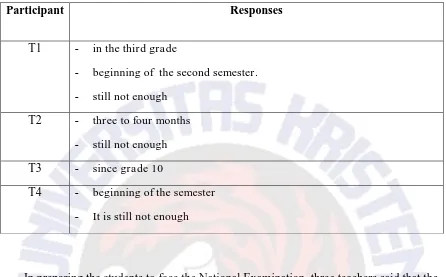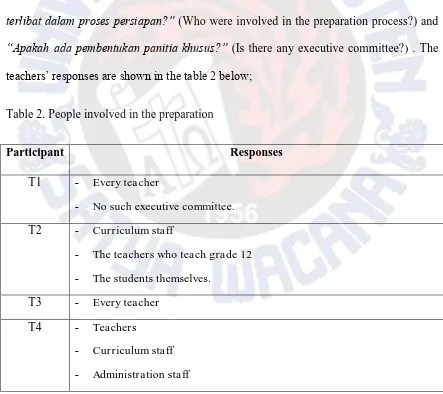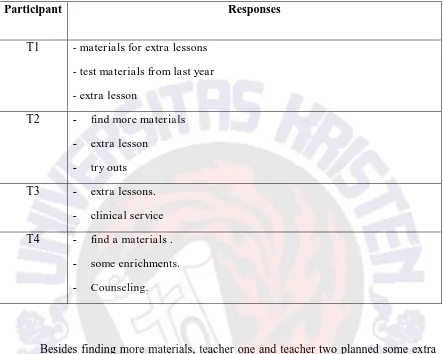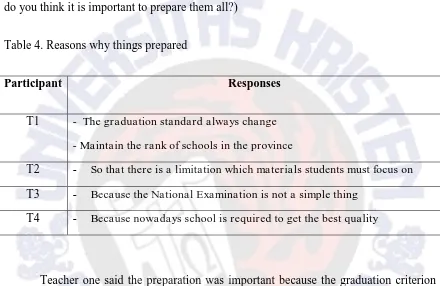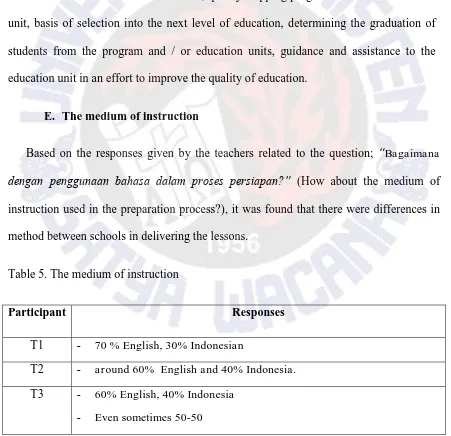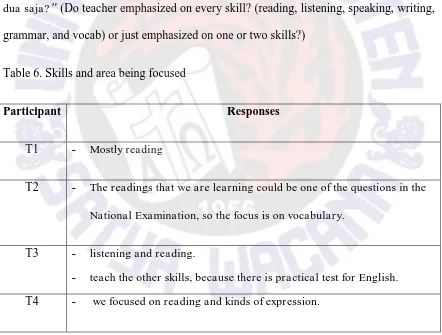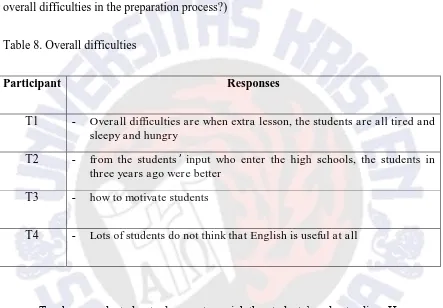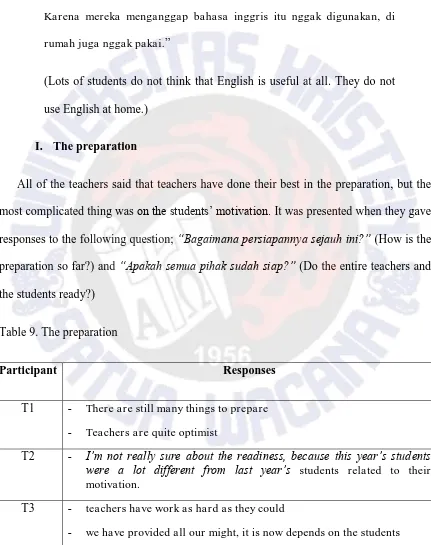Education is one of the main mediums in improving the quality of the people in a nation. Evaluation is used to measure students’ ability whether or not they have reached
the objective of the education. One type of evaluation that is applied by the government is the National Examination. National Examination is the action or process in a formal test of a person knowledge in particular subject (Sulistyo, 2004).
Testing has always been a crucial aspect of language education. Shohamy (2001) approaches the concept of testing from two perspectives: traditional testing and use-oriented testing. In traditional testing, the main focus is on designing quality tests to accurately measure the knowledge of testers. Traditional testing views tests as isolated events from test takers, education, and society. On the other hand, use-oriented testing views testing as embedded in educational, social and political contexts. It addresses issues related to the rationale for giving tests and the effects that tests have on test takers, education and society (Shohamy, 2001, p. 4). Issues such as what happen to the test takers who take the test, the teachers who teach for the test and methods or materials designed for the test are all taken into consideration in use-oriented testing. National Examination is one kind of use-oriented testing.
determine whether the students are able to pass from the school and as a base in facilitating the school to improve the quality of education. In other words, this low shows that National Examination is used to determine the students’ competencies whether they
could continue to the higher level of education.
Heaton (1990) stated that the reasons to have the examination are to find out about the progress of the students, students’ learning difficulties and their achievement.
This means if the teachers are successful in teaching, the students will be able to pass the examination. While according to Ahmadi and Supriyono (2003), the National Examination means a test in which the teachers can know the learning progress of the students and see whether the goals of learning have been achieved, then the teachers can plan things that should be done in the following year.
information about the students’ improvement before and after they passed the education
which covers the cognitive, affective, and psycho-motoric aspects. Susanto in Sulistyo (2004) stated that National Examination is a must for getting a certificate without paying attention to the responsibility of the students to their environment. In other words, the National Examination is just written proofs which do not reflect the reality. Moreover, Izza (2010) added that National Examination is a political necessity of the government which ignores the role of teachers in schools to assess and evaluate the learning result of their own students. Teachers only teach the materials while the government handles the National Examination.
the students with a high academic potential. From this point we can conclude that test-takers have to work harder to be selected or placed as their potential ability. Based on this objective, teachers need to prepare the students to face the National Examination well.
Preparing the students to face the National Examination requires a superb responsibility by the school, especially by the teachers themselves. The role of teachers in the preparation is very important, not only to motivate the students to be ready in facing the national examination, but teachers also need to organize a well-planned preparation. According to Burgess and Head (2005), to prepare the students for the examination, teachers find that teaching an examination class is very satisfying because students who will take the National Examination have certain goals and strong motivation to succeed. However, in Indonesian context, English teachers also find difficulties which come from students. The students tend to have vague objectives and low motivation in learning English, different studying habits and lack of English that makes the students unable to study English well. Therefore, students may fail in the examination (Hamalik. 1990).
Every school has to prepare well in order to get the best result. They give extra lessons before and after class. They give exercises to students almost every day, even in the school holiday. Some schools oblige the students, the last grader, to keep going to school to have extra lessons. Teachers work hard so that students can understand every lesson that they learned. Teachers also prepare the students to be ready for the examination.
this thesis to refer to the effects of tests or the National Examination in specific on course content, teaching, learning and classroom activities. There is already lot of research done on this specific aspect and they were used to establish theoretical framework in this thesis.
Much research on wash-back has been done. Researchers worked hard to find a clear distinction between wash-back and impact, which some scholars would regard them as the same. Biggs (1995) found out that wash-back sometimes can be referred to backwash which can be generally understood as the effect of an examination on teaching and learning. However, not all researchers agree to its definition. Alderson and Wall (1993) restricted the use of the term of wash-back to classroom behaviors of teachers and learners rather than the nature of printed and other pedagogic material (p. 118). They would also consider wash-back to be what teachers and learners do and what they would not necessarily do in the term of teaching and learning. Messick (1996) stated that in order to be considered as wash-back, good or bad teaching has to be evidentially linked to the introduction and use of the test (p. 16). Moreover, Wall (1997) made a clear distinction between wash-back and test impact. They believe that test impact would refer to the effect of a test on individuals, policies or practices, within the classroom, the school, the educational system or society as a whole.
As we see, wash-back is a complex matter. It does not only refer to the effect of an examination in the classroom, but also in the school, in the educational system and also in the society. Besides, this effect does not always take place directly but it is mediated by a number of factors, such as the teachers’ perception of the test and the
Alderson & Wall (1993) and Brown (2004) argued that wash-back becomes negative wash-back when there is a mismatch between construct definition and the test, or between content (e.g. the materials/abilities being taught). While, Weigle and Jensen (1997) stated that a test has positive wash-back if there is no difference between teaching the curriculum and teaching to the test.
Wash-back can happen in several ways: by test designers making publically available the contents and test methods of exams, by students studying, by publishers producing exam preparation materials, and so on. Another way – and one that has been studied often – is by teachers focusing on what the exam will cover. This seems to be the focus of the study. Teachers, as the person who should be responsible to teach the students, are busy to prepare the students for the National Examination. Wash-back is the effect of an exam on teaching and learning – including materials development, educational policy, curriculum design, etc. Teachers need to prepare well in finding suitable materials which focus on the content of the related examination. Hughes (1993) and Bailey (1996) also suggested that processes of wash-back for teachers include; what teacher teach, how teacher teach, the intensity of teaching and additional tutorials.
By seeing and understanding the importance of teachers’ preparations that has been discussed above, this study addressed the following research question; “What do
teachers and schools do to prepare the students for the National Examination in respond to the wash-back of National Examination for teachers?”
wash-back of National Examination for teachers. As we know, without any good preparation, there would not be any good result. It is hoped that the result of this study would be beneficial in many ways. The result of this study is expected to provide alternative information for the teachers and schools which have difficulties in preparing the students for the National Examination. Also, the result of this thesis may suggest other questions for further research on problems in preparing for the National Examination.
The Study
The participants of this study were four English teachers from four different high schools in Salatiga, public and private. The schools were SMA N 1 Salatiga, SMA N 3 Salatiga, SMA Kristen 1 Salatiga, and MAN Salatiga. The teachers were the head teachers of English subject who were in charge in the English National Examination’s preparation in each school.
Descriptive method was used in this study since the data and the result of this study were in the descriptive form. The main goal of this type of research was to describe the data and characteristics about what was being studied.
share about the research topic. The participants were given some questions in a neutral manner and after they shared their responses to the questions, they were asked follow-up questions and probed based on those responses.
There were nine main interview questions given to the participants. The interview questions covered all aspects related to the National Examination’s preparation process based on Hughes (1993) and Bailey (1996) including what things were prepared and focused, who involved in the preparation, when they began the preparation and the reason why things were prepared.
The first draft of the interview questions was given to an English teacher as a trial. The teacher was not included in the group of four English teachers who were given the final version of the interview questions. The main purpose of having the trial was to foresee the possible problems that could be encountered in the interview process.
All the interview sessions were conducted in Bahasa Indonesia in order to reduce the effects of a possible language barrier. Each participant was contacted and asked whether they could do the interview. All the interview sessions were done individually in well-planned schedule. Each interview sessions lasted approximately 10 minutes and were conducted from March to April.
responses toward the question. The main categories were defined in the transcribed data, and then, the data were studied for the purposes of further analysis and categorization. Main category of the data came from the teachers’ interviews about the preparation of the examination and problems that teachers face during the preparation.
Findings and Discussion
This section presents the analysis of the data based on teachers’ opinion. The description of the data in this section had been arranged and presented in nine discussions themes. The nine discussions themes were developed based on Hughes (1993) and Bailey (1996) related to the processes of wash-back for teachers which include; what teacher teach, how teacher teach, the intensity of teaching and additional tutorials. The nine subheadings are; the duration of the preparation, people who involved in the preparation, things being prepared, the reasons why things were prepared, the medium of instruction, skills and area being focused, other teaching and learning activities, overall difficulties, the preparation.
A. Duration of the preparation
All the teachers agreed that actually, preparation for the National Examination consumed a lot of time. Table 1 below presents their responses to the question; “Berapa lamakah waktu yang dibutuhkan untuk persiapkan ujian nasional?” (How long do the schools and the teachers need to prepare for the National Examination?) and “Apakah menurut Anda dengan waktu yang tersedia itu cukup untuk mempersiapkan semua nya?”
Table 1. Duration of the preparation
Participant Responses
T1 - in the third grade
- beginning of the second semester. - still not enough
T2 - three to four months
- still not enough
T3 - since grade 10
T4 - beginning of the semester
- It is still not enough
In preparing the students to face the National Examination, three teachers said that the preparation started in the beginning of the first semester in the third grade, but more intensively was when the second semester began, about three to four months before the National Examination. They agreed that the amount of time was too short, they needed more time. Below are the responses from three teachers;
T1: “Kalau mulainya sudah pasti sejak mereka kelas tiga, sejak awal tahun
ajaran. Cuma, yang lebih intensif itu sejak masuk semester dua. Saya
rasa ya masih tetep kurang ya. Soalnya kan banyak tuh yang harus
disiapkan.”
T2: “Membutuhkan waktu ya kira-kira empat bulanan, sebelum ujian
nasional. Ya masih kurang, kan ibaratnya kita merangkum dan mereview
materi dari kelas 10 sampai kelas 12.”
(We need about three to four months before the examination. It is still not enough, because it seems that we have to summarize and review all the materials from the first grade.)
Both teacher three and teacher four agreed that the preparation actually started when the students entered the first year of senior year because the materials would be taken from the first year materials. However, the preparation was done more intensively when the second semester started. Below is the response from the teacher three and teacher four;
T3: “Di mulai semenjak anak kelas satu ya. Kelas 10 kalau di SMA. Kalau
yang lebih intensif, di kelas 3.” (It actually starts when the students were
in the first year, but more intensively, the preparation starts when they
were in the third year)
T4: “Mulai sejak awal semester nanti sampai menjelang ujian nasional. Ya
masih kurang. Karena kita kan begitu kelas 12, itu kan kita harus
mengulang materi-materi yang sudah disampaikan dari kelas 10, 11.”
The duration of the preparation referred to the National Examination’s official schedule which was in April 2012 (http://118.98.223.68/dokumen/un2012/Tanya-jawab-UN-2012.pdf). Moreover, the focus of examination was usually released between the begining of second semester, so each scholl would only have aproximately five months to prepare everything intensively.
B. People involved in the preparation
Every school had different ways in the preparation regarding the people who were involved in the preparation as they gave responses to the question; “Siapa sajakah yang terlibat dalam proses persiapan?” (Who were involved in the preparation process?) and “Apakah ada pembentukan panitia khusus?” (Is there any executive committee?) . The teachers’ responses are shown in the table 2 below;
Table 2. People involved in the preparation
Participant Responses
T1 - Every teacher
- No such executive committee.
T2 - Curriculum staff
- The teachers who teach grade 12
- The students themselves.
T3 - Every teacher
T4 - Teachers
- Curriculum staff
Both teacher one and teacher three said that automatically, all third grade teachers were involved in the preparation because they must be responsible in the National Examination’ process. They added that there was executive committee who was in charge of arranging the schedule and other things related to the Examination. Below are the response from teacher one and teacher three;
T1: “Kalau yang terlibat otomatis semua guru. terutama guru yang
mengampu kelas tiga. Kalau panitia khusus, kayaknya nggak ada.”
(Every teacher was involved in the preparation process, automatically. Especially for teacher who teach the third year students. I think there is no such executive committee.)
T3: “Ya tentunya semua guru, itu masuk dalam tugas persiapan ujian
nasional.”
(All of the teachers of course, it is one of teachers’ task to prepare the
National Examination.)
Teacher two said that every teacher involved in the preparation because it was teachers’ duty. There was a committee who in charge of preparing the room, the
T2: “Yang terlibat disini antara lain adalah staff kurikulum, staff kurikulum
itu yang nanti mengatur jadwal, kemudian yang apa namanya, eee,
palaksanaanya nanti dari bulan apa sampai bulan apa, itu nanti yang
mengatur staff kurikulum, kemudian guru yang apa namanya, yang
mengampu bidang ujian nasional itu sendiri dan juga siswa kelas 12.”
(Lots of people involved, such as the curriculum staff who deal with the schedule, etc., the teachers who teach grade 12 and the students themselves.)
T4: “Guru yang terlibat dalam mapel ujian nasional, kemudian dari pihak
kurikulum, dari waka kurikulum, staff-staff kurikulum, semua terlibat di
situ dan dari yang lain termasuk dari tata usaha dan lain sebagainya”
(Teacher, curriculum staff, everyone involved and from the other including administration staff.)
Based on ministry of education and culture constitition, the National Examination demanded teachers and school to involve in the implementation process of National Examination (http://118.98.223.68/dokumen/un2012/Tanya-jawab-UN-2012.pdf).
C. Things prepared
Table 3. Things prepared
Participant Responses
T1 - materials for extra lessons
- test materials from last year
- extra lesson
T2 - find more materials
- extra lesson
- try outs
T3 - extra lessons.
- clinical service
T4 - find a materials .
- some enrichments.
- Counseling.
Besides finding more materials, teacher one and teacher two planned some extra classes which usually reviewed last year materials. The extra classes were conducted at noon after school from 2 pm to 4pm. They also organized more practice tests and reviewed the materials. They added, at the last holiday, the third year students also kept coming to schools to have extra lessons as it is shown from the first and second teacher’s responses below;
T1: “Ya otomatis materi-materi yang dipersiapkan di jam-jam tambahan.
Terus soal-soal ujian tahun-tahun sebelumnya. Jam tambahan, sekarang
(Some materials which are prepared for extra lessons. Then some examination tests which are taken from last year. Extra lessons which are performed after the school hours.)
T2: “Mempersiapkan soal-soal yang sudah ditentukan dengan SKL yang
keluar. Mengadakan jam pelajaran tambahan dan juga try outs.”
(Of course we should find more materials based on the competency standards of graduate also we plan extra lesson and try outs)
They also did the pre-test called try-out for 3 to 4 times to check students’ understanding. Teacher three said the she planned a clinical service, which means that when students faced some difficulties, they could ask the teacher whenever they wanted. They could send some SMS or call the teacher and then they planned to meet to discuss the difficulties.
T3: “Kemudian ada layanan klinis. Layanan kilnis itu misalnya anak punya
kesulitan, dia boleh bertanya kepada guru kapanpun.”
(There something named clinical service which when the students have difficulties, they could ask the teachers anytime.)
Teacher four informed that they also analyzed the students’ competencies and when the results of try-outs were not satisfying, they would have more things to discuss. Below is the response from teacher four;
T4: “Kita cari satu materi, materi yang merangkum keseluruhan. Kita
lagi, untuk materi yang belum tuntas berarti nanti perlu kita ulang lagi.
Kita adakan pengayaan lagi khusus untuk materi-materi yang belum
tuntas.”
(We find a material which covers the overall materials. We find last year examination tests. After tryout, we analyze again, when there are some uncompleted materials we review them again. We plan some enrichment for the uncompleted materials.)
Teacher four also added that his school prepared a kind of counseling. Every teacher had 7 to 10 third grade students and when they were having difficulties, the students could consult to their counselor and then the counselor would consult to the teacher to solve the difficulties. Below is the response from teacher four;
T4: “Satu guru membimbing tujuh sampai sepuluh anak. tidak di fokuskan
mapel tertentu, nanti kalau siswa ada kesulitan apapun bisa konsultasi
ke saya, jadi nanti saya yang menyampaikan.”
(A teacher guides seven to 10 students, not in a certain course, when students find difficulties they can consult and me as their counselor would convey it to certain teachers.)
D. Reasons why things were prepared
Each teacher had its own opinion about the reason why they worked so hard to prepare the students to face the examination. It was reflected as they replied to the following question; “Menurut Anda, kenapa hal-hal tersebut perlu dipersiapkan?” (Why do you think it is important to prepare them all?)
Table 4. Reasons why things prepared
Participant Responses
T1 - The graduation standard always change
- Maintain the rank of schools in the province
T2 - So that there is a limitation which materials students must focus on
T3 - Because the National Examination is not a simple thing
T4 - Because nowadays school is required to get the best quality
Teacher one said the preparation was important because the graduation criterion was always changing every year, especially the standard point of graduation. Also, she added that she needed to maintain the school to be at least the best ten of schools in the province area to keep the good reputation as it is shown in her response below;
T1: “Setiap tahun itu kriteria kelulusan kan berubah-ubah. Dan paling tidak
kita tetap jaga ranking di kota dan di tingkat provinsi pun berusaha
menembus 10 besar.”
Teacher two said that the aim of the preparation was to have a focus in the material, so that the students could pay more attention on which thing that they should learn in the National Examination, also to prepare the students to face SMPTN. Below is the response from teacher two;
T2: “Ya tentu saja biar nanti anak-anak itu lebih apa namanya, ada
pembatasan mana yang lebih mereka fokuskan untuk menghadapi ujian
nasional besok.”
(So that there is a limitation which materials students must focus on.)
Teacher three agreed that the National Examination was not a simple matter, so that it must be prepared as best as it should and because it was also related to students’ future. Below is the response from teacher three;
T3: “Karena ujian nasional itu bukan hal yang sepele atau untuk disepelekan.
Karena ini hal yang penting juga untuk masa depan anak-anak.”
(Because the National Examination is not a simple thing, it related to every future of every student)
Meanwhile, teacher four added that nowadays, teachers were required to achieve the best quality. In other words, the result of National Examination should reflect to the students’ real condition. There were controversies which stated that the National
T4: “Kita itu di tuntut untuk bisa untuk mendapatkan kualitas yang memang
bener-bener menggambarkan keadaan siswa yang sebenernya.”
(Because nowadays school is required to get the best quality which reflect to the reality of the students.)
Teachers and schools agreed that the reasons why they needed to prepare a lot of things referred to the 68th paragraph about National Examination which stated that National Examination could be used as; quality mapping programs and / or educational unit, basis of selection into the next level of education, determining the graduation of students from the program and / or education units, guidance and assistance to the education unit in an effort to improve the quality of education.
E. The medium of instruction
Based on the responses given by the teachers related to the question; “Bagaimana dengan penggunaan bahasa dalam proses persiapan?” (How about the medium of
instruction used in the preparation process?), it was found that there were differences in method between schools in delivering the lessons.
Table 5. The medium of instruction
Participant Responses
T1 - 70 % English, 30% Indonesian
T2 - around 60% English and 40% Indonesia.
T3 - 60% English, 40% Indonesia
T4 - Indonesia 60%, English 40%
Teacher one said the in the preparation process she used more English than Indonesian; it was around 70% of English and 30% of Indonesian. Meanwhile, teacher two said that they used 60% English and 40% Indonesian. They were more focused on the vocabulary and spoken language. When the students faced difficulties in getting the meaning of certain materials, teachers would explain them using Indonesian. Below are the responses from teacher one and teacher two;
T1: “Kalau disini lebih di utamakan Englishnya. Jadi paling tidak ya sekitar
70, 30.”
(Here, we focus in English, so it is about 70 and 30.)
T2: “Untuk bahasanya ya seperti pada umumnya, sekitar 60% 40%. Kita
lebih fokus pada vocab dan bahasa lisan.”
(Just in general, 60% and 40%, we focus on vocabulary and spoken language.)
Teacher admitted that she often used different way of teaching. Instead of 60% English and 40% Indonesian, she tended to use 50% English and 50% Indonesian. This method is used when her students find difficulties to understand the lesson in English. Below is the response from teacher 3;
T3: “ Biasanya saya mengajar dengan 60% 40% atau bahkan 50% ya. 50%
mereka mengerti dalam bahasa inggris, saya menggunakan bahasa
indonesia.”
(I usually teach with 60% and 40% or even 50% each. 50% English and 50% Indonesian. When things seem too hard to be understood in English, I use Indonesian)
Surprisingly, regarding the students’ ability, teacher four realized that his students were not as good as the other students from other school, so he used 40% English and 60% Indonesian. It was used to reduce the time consuming. When the students faced difficulties in getting the meaning of certain vocabulary, the teacher explained using Indonesian. He also added that a lot of examination tests were about the vocabulary and he agreed that translation was the most effective learning strategies. Below is the response by teacher four;
T4: “Bahasa indonesia 60 bahasa inggris sekitar 40. Kenapa, karena kita
mengejar kemampuan siswa dalam kemampuan menjawab soal yang
kebanyakan kosakata, vocab.”
(Indonesia 60%, English 40%. Because we try to enable the students ability to answer questions which mostly about vocabulary.)
F. Skills and Area being focused
Teachers said that the area being focused was determined by the standard point of graduation (SKL) and this year, the National Examination was focused on reading and listening. So the preparation process was more focused on reading and listening. Table 6 below presents their responses to the following question; “Bagaimana dengan skill dan area yang lebih ditekankan selama proses persiapan?” (How about the language skills
and areas emphasized in the preparation process?) and “Apakah ditekankan ke semua skill? (reading, listening, speaking, writing, grammar, and vocab) atau hanya satu atau
dua saja?” (Do teacher emphasized on every skill? (reading, listening, speaking, writing,
grammar, and vocab) or just emphasized on one or two skills?)
Table 6. Skills and area being focused
Participant Responses
T1 - Mostly reading
T2 - The readings that we are learning could be one of the questions in the
National Examination, so the focus is on vocabulary.
T3 - listening and reading.
- teach the other skills, because there is practical test for English.
T4 - we focused on reading and kinds of expression.
there would be more materials tested in the reading section, the preparation is more focused on the reading. The response from teacher one can be found below;
T1: “Yang diutamakan kan listening sama reading. Tapi, karena bobot
reading lebih banyak, jadi persiapannya juga lebih banyak di
readingnya”
(The focus is on listening and reading. However, as the amounts in reading section are much, so the preparation is more on reading.)
Teacher two said that she focused on vocabulary, because to be able to answer the questions in National Examination, the students needed a good vocabulary understanding. Below is the response from teacher two;
T2: “Bacaan yang kita pelajari sekarang, mungkin juga keluar di ujian
nasional, jadi fokusnya ke vocabulary.”
(The readings that we are learning could be one of the questions in the National Examination, so the focus is on vocabulary.)
Teacher three said that in this preparation process, he also focused on kinds of expression as it is shown from his response below;
T4: “Untuk ujian nasinal, kita fokuskan ke reading dan expression, kind of
expression.”
Teacher four added that the other two skills, speaking and writing, were also taught but in less portion. These two skills were used for practice examination such as interview and story-telling, delivering speech and some dialogues. Below is the response from teacher three;
T3: “Untuk ujian nasional materinya adalah listening dan reading. Tetapi
dalam pengajaran pun, kita mengajarkan ke empat skill, writing dan
speaking juga. Karena kalau untuk bahasa inggris kan ada ujian praktek
juga.”
(We focus on listening and reading. But in the field, we also teach the other skills, because there is practical test for English.)
Teachers focussed more on listening and reading because the English National Examination standards of graduate (SKL) was focussed on listening and reading (http://www.googledocsviewer.com/2011/12/kisi-kisi-un-2012-un-sma.html).
G. Other teaching and learning activities
All teachers agreed that National Examination would cause the students to be very nervous. So, teachers managed some fresh and fun activities to reduce the level of stress. It can be found on the following responses to the question; “Apakah ada kegiatan belajar mengajar lain seperti menonton film atau mendengarkan music?” (Is there any other
Table 7. Other teaching and learning activities
Participant Responses
T1 - To reduce the stress level
T2 - As a relaxation medium to reduce the boredom
T3 - To make their own ending of a certain movie
- By listening to music, students could learn grammar and vocab
T4 - We reduce its portion.
- to reduce the boredom, sometimes we send them to the LAB
In order to reduce the boredom, teachers used other teaching learning activities such as watching movies or listening to music. They realized that students needed something fun and fresh so that they could not easily feed up with the materials and hopefully could reduce the stress level. They believed that some fun activities such as watching movies and listening to some songs are effective relaxation medium. However, when the students had been given an activity such as watching movies, it was not only just watching movies in general whereas the movies should be motivating movies. Also, there must be a follow up regarding the movies. Teachers gave assignment related to the movies, such as by making new ending. Below are the responses from all teachers;
T1: “Yak karena itu untuk mengurangi kebosanan. Karenakan kalau menjelang UAN
(To reduce boredom because the stress level is rising as the National Examination come)
T2: “Pasti kejenuhan itu ada. Kalau dikasih materi materi materi terus,
takutnya nantu malah nggak nyampek. Makanya kadang saya makai
relaksasi sebentar”
(There must be boredom. I’m afraid the students would not get the
materials well. So I would do some relaxation.)
T3: “Menonton film pun ya tidak hanya membuang waktu, tapi ada yang
dipelajari disana. Mungkin nanti mereka harus mengembangkan
endingnya dengan imajinasi mereka. Atau kalau lagu bisa juga belajar
grammar atau vocab dari lagu kan juga bisa.”
(Not only watching movie, but there should be something to be learnt. Maybe students shall make their own movie’s ending. Or, by listening to music, students also could learn grammar and vocab.)
T4: “Untuk menghadapi ujian menghadapi nasional, porsinya agak kita
kurangi. Tapi untuk menghilangkan kejenuhan kita kadang megajak
mereka ke LAB”
H. Overall difficulties
All teachers agreed that the main difficulty was not about the material but it was related to the students’ motivation. It was evidenced from their responses to the interview question; “Apa kesulitan secara keseluruhan dalam proses persiapan?” (What are the overall difficulties in the preparation process?)
Table 8. Overall difficulties
Participant Responses
T1 - Overall difficulties are when extra lesson, the students are all tired and sleepy and hungry
T2 - from the students’ input who enter the high schools, the students in three years ago were better
T3 - how to motivate students
T4 - Lots of students do not think that English is useful at all
Teachers conducted extra lessons to enrich the students’ understanding. However,
students tended to be sleepy or to chat in the extra lesson because they were hungry and sleepy, or because they would still have other extra lessons in private course after it. Below is the response from teacher one;
T1: “Kalau kesulitan secara keseluruhan yang pasti itu siswa itu sudah capek,
terutama dalam hal tambahan pelajaran. Siang hari mereka sudah
merasa capek, itu kadang nggak masuk. Sudah ngantuk lah, yang
(Overall difficulties are when extra lesson, the students are all tired and
sleepy and hungry.)
Teacher two added that the students’ input, were different from the students’ input three years ago as it is shown from her response below;
T2: “dari input anak-anak masuk ke SMA, 3 tiga tahun yang lalu mugkin
inputnya lebih bagus.”
(…from the students’ input who enter the high schools, the students in
three years ago were better.)
While teacher three found difficulties to motivate students so that they kept studying hard because the National Examination is important. Some students thought that the National Examination was like another common test. Below is the response from teacher three;
T3: “Saat memotivasi siswa agar tetap belajar karena Uujian nasiaonal ini
sangatlah penting. Beberapa siswa sering berganggapan bahwa ujian
nasional itu hanya seperti tes-tes yang lain.”
(Motivate students to keep studying hard, because the National Examination is important. Some students thought that the National Examination was like another common test)
environment. The most difficult problem was to change this mindset, mindset which stated that English is not important. Here is the response from teacher four;
T4: “Mayoritas dari mereka menganggap bahasa inggris itu nggak penting. Karena mereka menganggap bahasa inggris itu nggak digunakan, di
rumah juga nggak pakai.”
(Lots of students do not think that English is useful at all. They do not use English at home.)
I. The preparation
[image:30.612.91.522.156.701.2]All of the teachers said that teachers have done their best in the preparation, but the most complicated thing was on the students’ motivation. It was presented when they gave responses to the following question; “Bagaimana persiapannya sejauh ini?” (How is the preparation so far?) and “Apakah semua pihak sudah siap?” (Do the entire teachers and the students ready?)
Table 9. The preparation
Participant Responses
T1 - There are still many things to prepare
- Teachers are quite optimist
T2 - I’m not really sure about the readiness, because this year’s students were a lot different from last year’s students related to their motivation.
T3 - teachers have work as hard as they could
T4 - not yet maximum - still some lacks
Teacher was quite optimist due to the preparation. She thought so regarding the result of try-outs. Besides, all teachers and staffs have been working so hard, however there were still many things to be prepared. Below is the response from teacher one;
T1: “Para guru dan staff sudah bekerja sangat keras untuk mensukseskan
ujian nasional. Saya sendiri cukup puas dengan hasil try-out kemarin.
Tapi, agar mendapatkan hasil yang lebih baik, masih banyak hal-hal
yang harus dipersiapkan.”
(Teachers and staffs have been working so hard. I am quite satisfied by seeing the result of last try-out. However, to get better result, there were still many things to be prepared)
T2: “Kalau persiapannya, saya nggak begitu yakin ya. Karena untuk
angkatan ini kayaknya anak-anak itu semangatnya jauh sekali,
dibanding tahun-tahun yang kemarin. Kekurangannya, ya masih banyak
sekali. Tapi misalnya kalau saya mau memaksa anak ya mereka sudah
sangat jenuh. Jadi inginnya segera menghadapi ujian nasional, terus
langsung terima hasilnya gitu.”
(I’m not really sure about students’ readiness, because this year’s students are very different from last year’s students related to their motivation. I can’t force them, because they are already nauseated. They
just want to do the test and get the result.)
Teacher three added that it was depending on the students’ level of readiness. She argued that some students might become so much nervous in the examination room. She motivated students to concentrate because actually, this English test was actually easier than the other courses. For example, for the reading section, the students only needed to find the answers which already existed in the question or the text.
T3: “Kalau dari guru sih sudah mempersiapkan dengan maksimal. Istilahnya,
kita sudah memberikan yang terbaik sama anak-anak. Kesulitan mereka
juga kita membantu untuk mengcover. Nanti tinggal yang bagaimana
anak-anaknya. Kadang kan ada anak yang pintar pun, ketika
(We, as teachers have work as hard as we could, we have provided all our might, it is now depends on the students. A clever student could forget everything if he or she is nervous.)
Teacher four admitted that their preparation was quite far from perfection. There were still a lot of things to be prepared. He also realized that students were not only prepared to face the English examination but they would face other examination which basically more difficult than English, such as Mathematics. Below is the response from teacher four;
T4: “Saya kira belum maksimal. Hasil kognitif, itu masih kurang, masih
banyak kekurangan. Kita kan sudah paham, yang mereka pelajari kan
bukan cuma satu mapel. Biasanya yang sulit itu kan ada matematika.”
(I believe it is not yet all-out. Cognitively, there are still a lot of lacks. Teachers understand that students do not only learn one course, they also have to learn other difficult course which is Mathematics.)
Conclusion
The purpose of this thesis was to find out what sort of preparation that teachers and schools do to prepare the students to face the National Examination. Teachers and schools have to prepare a lot of things to face the National Examination. All teachers agreed that to be able to be prepared well, they needed a lot time. Teachers and schools realized that National Examination is a very important matter and without good preparation there will be no good result. Besides it related to students’ future, the result of the National Examination determines the quality of the schools. Everyone should be responsible in the preparation process, not only the teachers but also the school staffs and even students should work together to make National Examination become successful. Good coordination was needed to achieve the best result. Schools designed a new curriculum regarding the National Examination, including scheduling extra lessons after class and executing try-outs, while teachers were struggling to find the most suitable materials and teaching methods. National Examination increased the students’ level of
stress. Teachers used attractive teaching activities, such as watching movies and listening to music as relaxation activities. As the students got so many materials almost every day, these kind of teaching activities were needed to reduce the boredom. Teachers admitted that students did not only have prepared for one important test but also the five other important tests. One thing appeared to be the most difficult thing to overcome was how to motivate the students and how to change students’ mindset that English is not an
important thing. Compared to students from language program, the science and social program’s students tended have less attention to English because they did not plan to use
English. Students should be more responsible to their own study and be more motivated to get the best result in the National Examination. As the result, they can ease the teachers and schools’ preparation process. Teachers and schools really play important role to
Acknowledgment
References
Ahmadi, A., & Supriyono W. (2004). Psikologi Belajar. Jakarta: Rineka Cipta.
Alderson, J.C., & Wall, D. (1993). Does washback exist? Applied Linguistics, 14:2, 115-129.
Bailey, K. M. (1996). Working for washback: A review of the washback concept in language testing. Language Testing, 13 (3), 257-279.
Berberoglu, G. (1996). The university entrance examinations in Turkey. Studies in Educational Evaluation, 22(4), 363-373.
Biggs, J. (1995). Assumptions Underlying New Approaches to Educational Assessment. Curriculum Forum, 1-22.
Burgess, S., & Head, K. (2005). How to Teach for Exams. London: Longman.
Hamalik, O. (1990). Metoda Belajar dan Kesulitan-kesulitan Belajar. Bandung: Tarsito.
Heaton, J.B. (1990). Longman keys to language teaching. Classroom Testing. London: Longman.
Hughes, A. (1993). Backwash and TOEFL 2000. Reading, U.K.: University of Reading.
Kisi-Kisi-Untuk-SMP-MTs-SMPLB-SMA-MA-SMALB-dan-SMK
(http://www.googledocsviewer.com/2011/12/kisi-kisi-un-2012-un-sma.html).
Manjarres, N. B. (2005). Washback of the foreign language test of the state examinations
in Colombia: A case study. Arizona Working Papers in SLAT, 12, 1-19.
Messick, S. (1996). Validity and Washback in Language Testing. Language Testing, 13(4), 241-256.
Pasal 66 ayat (1) Bagian IV Bab X Peraturan Pemerintah RI No. 19/2005 tentang Standar Ujian Nasional Pendidikan dan Pasal 2 Permendiknas No. 78/2008 tentang Ujian Nasional SMP/MTs/SMPLB/SMALB, dan SMK tahun pelajaran 2008/2009.
Pasal 68 Bagian IV Bab X Peraturan Pemerintah RI No. 19/2005 tentang Standar Ujian Nasional Pendidikan dan Pasal 3 Permendiknas No. 78/2008 tentang Ujian Nasional SMP/MTs/SMPLB/SMALB, dan SMK tahun pelajaran 2008/2009.
Purwantini. C., & Purwanti, R. E. (2007). Persepsi Guru, Siswa, dan Orang Tua
terhadap UN Studi Empirik SMP-SMP di Kotamadya Jogjakarta. 35-50.
Shohamy, E. (2001). The power of tests: A critical perspective on the uses of language tests. Harlow: Pearson Education.
Sulistyo, G.H. (2008). English as a Measurement Standard in the National Examination: Some Grassroots’ Voice. LINGUA Jurnal Ilmu Bahasa dan Sastra, 3 (2).
UN, ada yang perlu didiskusikan
.http://kompas.co.id/kompascetak.php/read/xml/28/05/05/00495441/un.ada.yang. perlu.didiskusikan.
Weigle, C., & Jensen. L. (1997). Issues in Assessment for Content- Based Instruction. In: Snow and Brinton (eds.) The Content-Based Classroom. New York: Longman.
